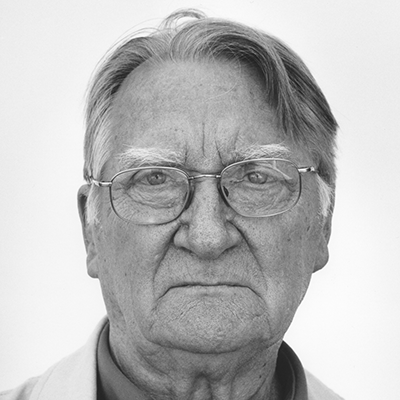The Story of a Poet...
Sam Abrams
Màrius Sampere was born in Barcelona on 28 December 1928 in carrer de la Igualtat (now called carrer de Cartagena) in the Guinardó neighbourhood. His father, Antoni Sampere Forns, was an office worker, as was his mother Adela Passarell Semper. Antoni Sampere was a tough, tenacious man, who was deeply attached to his country, while Adela Passarell was a sensitive, delicate and cultured woman. From 1929 to 1941 they were separated and during those years Màrius lived with his mother and his family.
The Spanish Civil War brought an end to the family's relative economic well-being so that Màrius Sampere's education coincided with a period of great privation and enormous personal suffering. He was educated, first, in neighbourhood schools and, later, he studied for his school-leaving examinations at the Institut Balmes and a private academy. His first poetic endeavours (in Spanish) should be situated in this period of his education, between 1939 and 1940. In fact, he had already discovered the world of literature through his mother and maternal grandfather in the family library.
In 1942, after deciding to live together again, Sampere's parents set up house in carrer Andreu Vidal in the neighbourhood of Sant Adrià del Besòs. As a result of the family's situation, his formal education came to an end when he finished his school-leaving examinations and, in 1944-1945, he started to work in photographic studios and advertising in Badalona and would continue to work in this profession until after post-Franco transition years when he became a civil servant working in the area of linguistic assessment and normalisation.
Besides this professional existence, Sampere began his musical training in 1953 with studies in musical notation, piano, harmony and counterpoint. As a result, he became the lyricist, composer and a musician in the group Grup Estrop, between 1963 and 1967. Sampere's poetry began to makes its presence known in literary and social circles at the end of the 1950s when the young writer entered unpublished work for several literary prizes. At was in this period, in 1958, that Sampere changed his literary language and wrote his first poems in Catalan.
In 1960 Sampere went on a long journey by car through Scotland and England. On his return, he formalised his traveller's impressions in a lengthy series of poems written in 1960-1961, and these were to constitute the basis of his first book in Catalan Viatge amb automòbil [Automobile Journey], which was not published. Immediately afterwards he set to work on a new collection of poems, L'home i el límit [Man and Limit] with which he was to win the Carles Riba Prize in 1963. The fact of being awarded the Carles Riba Prize might be considered as the "formal" debut of Màrius Serra as a poet, even though the prize-winning collection would not be published until 1968.
At the end of the 1960s, Sampere's professional commitments took him to live in Santa Coloma de Gramenet. In 1969 he married Maria del Carme Tarrés, who gave him the intellectual, emotional and human support he needed as the firm base on which to build his work, especially after the deaths of his father (1968) and mother (1973). This period was a very creative time for Sampere, leading to a high degree of participation in different literary competitions (the Jocs Florals in Marseille, Badalona, Zurich, Guadalajara, Brussels, and Geneva, after the last of which he was named Mestre en Gai Saber (Master in the Art of Poetry) in 1972 and to his completing a new book, Poemes il·lícits [Illicit Poems], which received the President Macià Prize in Amsterdam in 1974.
In 1975, Sampere definitively consolidated his career as a poet when he was awarded the Ribas i Carreras of Blanes Prize with his Poemes de baixa freqüència [Low Frequency Poems]. This book, published in 1976, is one of Sampere's most extensive works since it brings together almost half his production of unpublished poems written between 1963 and 1973. In 1980, he was a finalist for the López Picó de Vallirana Prize with a book that he subsequently subjected to a thorough reworking.
The 1980s brought two major changes for Sampere. First, was his new and more gratifying professional life and, second, there was more continuity in the publication of his work thanks to a stable agreement with a well-established poetry publisher. He began the decade being awarded the 1982 Jordi de Sant Jordi Prize in Valencia with the collection Samsara, of remotely oriental inspiration, a book that would be published the same year. In 1983 he was one of the finalists for the Vicent Andrés Estellés Prize in València and his book, Qüestions menors [Minor Issues], captured the attention of the poet and publisher Àlex Susanna. Two years later, in 1984, he received the Miquel de Palol Prize of Girona with Llibre de les inauguracions (Book of Inaugurations). With the publication of this prize-winning work in 1986, Sampere began his long association with the publishing house Columna, putting an end to his forlorn pilgrimage from prize to prize and publisher to publisher. Since 1986, in a natural and regular fashion, Sampere has continued to publish the volumes that comprise the body of his work today: Oniris i el tret del caçador [Oniris and the Hunter's Shot] (1987), L'ocell que udola [The Howling Bird] (1990), La taula i les estrelles [The Table and the Stars] (1992), La cançó de la metamorfosi [Song of Metamorphosis] (1995) and Demiúrgia [Demiurge] (1996).
Recently, following the publication of Thanatos suite [Seuba Ediciones] (1997) and the present anthology, Sampere has began to diversify his presence in the publishing world. Recently, too, he has seen unequivocal signs of recognition of the great literary value of his poetic oeuvre by readers, critics and Catalan institutions.
Prologue to Si no fos en secret (If It Weren't in Secret), an anthology of poems edited by Sam Abrams and Jaume Subirana -© Edicions Proa, 1999-




